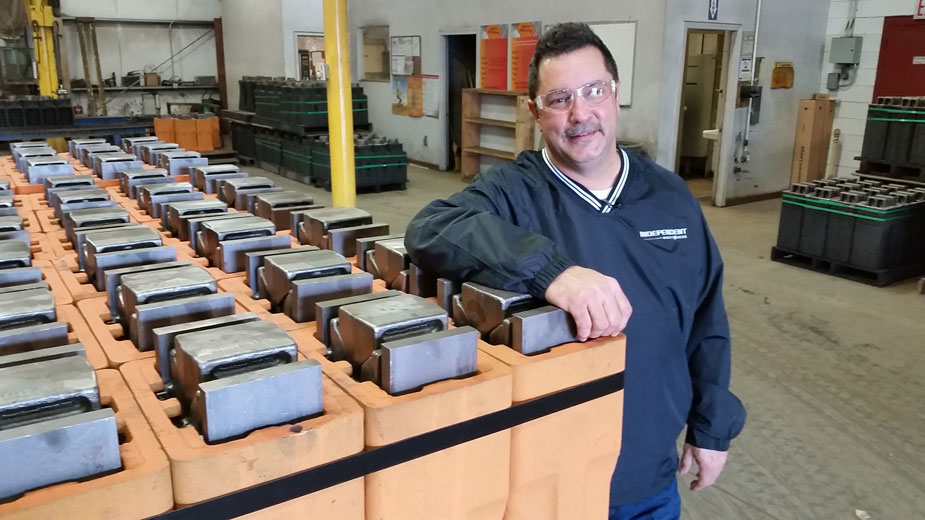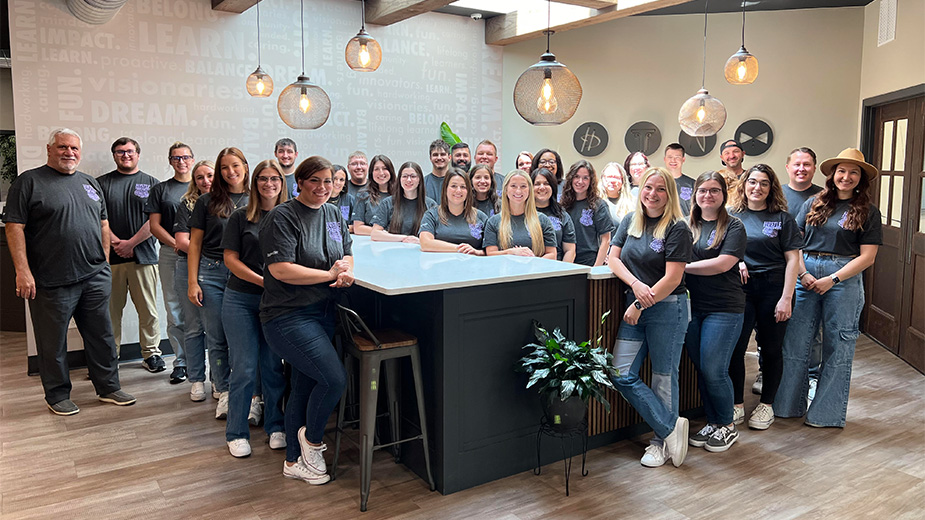Energy Downturn Slows Track for Rail Suppliers
YOUNGSTOWN, Ohio – Stiffed by the plunge in oil prices and a declining coal market, companies that provide services to the railroad and rail car industry have witnessed business level off on the heels of an extraordinary run over the last several years.
So say Dave Trombitas, vice president and general manager of Independent Draft Gear in Farrell, Pa.; Robin Eisenbrei, president and CEO of Morrison Metalweld, Canfield; and Duke Wintrow, executive operations manager at Wintrow Construction based in Barberton.
These companies remain busy, though, and the recent downturn through the first quarter is in comparison to record-setting years for some of these businesses.
“We’re not where we were this time last year,” Trombitas says. “Last year, we were breaking records constantly, every month.”
His company, Independent Draft Gear, a subsidiary of A. Stucki Co., Pittsburgh, manufactures and reconditions draft gears for the freight-car industry. Draft gears are heavy-metal, spring-loaded mechanisms installed behind couplers on the ends of freight cars. They also absorb the shock that results when one car is latched to another. “It’s essentially a cushioning unit,” Trombitas says.
Business has since leveled off, but not before the company enjoyed two very productive years as the rail industry boomed, Trombitas says. “New rail car builds were pretty heavy,” he relates.
In 2015, he estimates, manufacturers produced more than 70,000 new rail cars. On average, the new build rate is between 35,000 and 45,000 a year.
The manufacturing market soared largely because of two factors, Trombitas adds. “Scrap prices were good last year, so a lot of old rail cars were scrapped,” he says, and that money was reinvested in new cars. “When that market is up, that helps us.”
Another reason was demand. Independent Draft Gear filled orders placed months earlier for tanker trucks used in the oil and gas industry.
However, the reversal in the oil and gas market, as well as the continuing decline in the coal industry, has dramatically reduced activity in the rail business compared to previous years, Trombitas says. “The entire industry is down as a whole because of the coal market and the decline in oil prices.” The fact that 2016 is an election year doesn’t help, he adds, noting some companies are holding off on spending until the election is over.
Trombitas has worked in this business nearly 20 years, so he’s witnessed cyclical downturns before. And, although business was slow to begin the year, last month orders started to pick up.
“We supply all over the U.S.,” Trombitas says. The bulk of Independent Draft Gear’s customers cut through the Midwest, from the Great Lakes to Texas. The company is active in international markets as well, distributing its products to Brazil, India, Mexico, Canada, the United Kingdom, South Africa and Australia.
Aside from reconditioning used draft gears, the company assembles its proprietary product at its Farrell site, Trombitas says. “Stucki purchased the product back in 2003 or 2004 and we modified it,” he says. In 2008, the draft gears were introduced first in Brazil and then in India.
“Over the last five years, I’d say there are more than 10,000 in Brazil and 50,000 to 60,000 of these in India,” he reports.
Now, Trombitas wants to attract domestic rail companies to Independent Draft Gear’s product. “One of the things we’re trying to do is go after private car owners,” he says. “These are huge companies and some have 5,000 to 10,000 cars in their fleet” he says. “Some have 100,000.”
The company is in the midst of a 3,500-square-foot expansion at the Farrell plant to accommodate new draft gear assembly, Trombitas notes. “We’re going to use this side for testing as well,” he says.
One aspect of the rail industry that appears to be doing well is track repair and maintenance, says Eisenbrei at Morrison Metalweld. “Right now, business is very good,” she says. “We’re seeing a little slowdown, but that’s not unusual during an election year.”
Morrison Metalweld provides welding services to rail tracks of all kinds, mostly for short line and industrial concerns. “We work for 2,500 clients a year,” she says, a number that includes its sales department, which supplies components and materials used in the rail industry. “We sell lubricators and lubricants, different types of track mats, rail joints. We represent a company that fuses rail together through a chemical process. At one point we even sold locomotives.”
Today, much of the business is derived from a patented welding technique the company developed more than 60 years ago when it was headquartered in Buffalo, N.Y., Eisenbrei says. In the late 1970s, Morrison Metalweld was sold to Youngstown-based Torent Inc., and relocated its offices to Canfield. Eisenbrei later purchased the company.
“The whole concept is that you don’t have to replace the track and can instead give it extended life,” she says. Overhead crane rails, internal industrial tracks, bridge rails, tracks at shipping terminals: All are potential customers for Morrison.
“We have a very large client base. We do some work for the mainline railroads, since we get called in for overflow jobs,” she says.
For example, Morrison Metalweld has dispatched welders working on a job in one of Nucor Steel’s plants in the South, a phosphate mine in Wyoming, a transit system in Portland, Ore., a power plant in Texas, and a short line in southern Indiana.
“Every given day it changes,” she remarks.
Over the last 10 years, Eisenbrei says, companies have turned more to subcontractors such as hers to repair and maintain tracks.
This places Morrison in a position to hire and train more skilled welders, Eisenbrei adds. “My business is a little bit different. I have my own apprenticeship program, and it takes quite a bit of time to teach someone.”
While demand remains strong for maintenance services of rail track, construction of new track has slowed considerably since the oil and gas market plunged, observes Wintrow from the Barberton construction company.
“I’m building two new tracks right now,” he reports. “This time last year, I was working on six or seven.”
Wintrow’s company constructs new track and refurbishes existing tracks, mostly for private industry and short lines.
Among the biggest projects his company has worked on was the $12 million new rail yard project that was part of Vallourec Star’s $1 billion expansion in Youngstown.
“The new-build projects aren’t what they used to be, but we’re seeing a lot of maintenance work,” Wintrow reports. “I travel mostly in Indiana, Ohio, Pennsylvania and West Virginia and have 100 guys in the field today. They’re all busy.”
Pictured: Dave Trombitas is the general manager of Independent Draft Gear, Farrell, Pa., which reconditions rail car components.
Copyright 2024 The Business Journal, Youngstown, Ohio.


